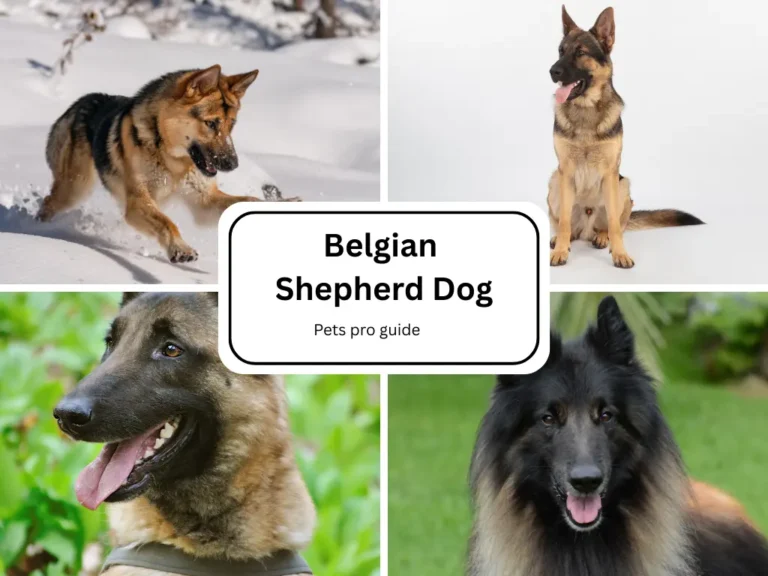German Shepherd Breed Information: Welcome, readers! Anastasia here, ready to divulge all you need to know about German Shepherd breed, complete with a delightful compilation of heartwarming pictures!
Welcome to our comprehensive guide on German Shepherd breed information and pictures. If you’re considering bringing a loyal, intelligent, and versatile canine companion into your life, the German Shepherd might be the perfect choice for you.
In this blog post, we’ll explore the origin, appearance, personality, training needs, health conditions, and more about this remarkable breed. So, let’s dive into the world of German Shepherds!
Also Check: Beagle Breed Information

- Core statistics
- History and Origins
- Other Names for German Shepherd Breed
- German Shepherd Size & Weight
- Appearance
- Personality
- Temperament
- Nutrition and Feeding
- Space Requirements
- Training & Exercise
- German Shepherd Grooming
- Common German Shepherd Breed Health Conditions
- German Shepherd Care Pro Tips
- Is German Shepherd Good Family Dog?
- What to know before you buy a German Shepherd?
- German Shepherd Breed Fun Facts
- FAQs
- 1. Q: Are German Shepherds good with children?
- 2. Q: Do German Shepherds shed a lot?
- 3. Q: Are German Shepherds easy to train?
- 4. Q: Do German Shepherds get along with other pets?
- 5. Q: How much exercise do German Shepherds need?
- 6. Q: Are German Shepherds good guard dogs?
- 7. Q: Are German Shepherds hypoallergenic?
- 8. Q: Do German Shepherds have health issues?
- 9. Q: Do German Shepherds need a lot of grooming?
- 10. Q: Are German Shepherds good family pets?
- Conclusion
- Read More
Core statistics
Here are some core statistics:
- Size: Large
- Coat: Double coat, groom weekly
- Life span: 9-12 years
- Breed group: Working/Herding
- Temperament: Loyal, intelligent, energetic
History and Origins
The German Shepherd breed originated in Germany in the late 19th century. They were originally bred for herding and protecting sheep, and their intelligence and versatility soon caught the attention of the German military. Over time, German Shepherds gained popularity as working dogs in various roles, including police work, search and rescue, and service dogs due to their exceptional trainability and loyalty.
Other Names for German Shepherd Breed
Here are some other names for German Shepherd:
- Alsatian Shepherd (commonly used in some parts of the world)
- Deutscher Schäferhund (the original German name)
German Shepherd Size & Weight
- Male German Shepherd:
- Size: 24-26 inches (60-65 cm) tall at the shoulder
- Weight: 65-90 pounds (29-41 kg)
- Life Expectancy: 9-13 years
- Female German Shepherd:
- Size: Slightly smaller than males, typically 22-24 inches (55-60 cm) tall at the shoulder
- Weight: 50-70 pounds (23-32 kg)
- Life Expectancy: 9-13 years
Appearance
The German Shepherd is a large and well-muscled breed with a noble and commanding presence. They have a double coat consisting of a thick, weather-resistant outer coat and a dense undercoat. The most common coat colors are black and tan, but they can also come in sable, solid black, and solid white.

Personality
German Shepherds are renowned for their intelligence, loyalty, and courage. They are highly trainable and eager to please their owners, making them exceptional working dogs and family pets alike. They are protective of their families and can be wary of strangers, which makes them excellent guard dogs.
Temperament
The German Shepherd’s temperament is characterized by confidence, self-assurance, and a willingness to work. They are alert and quick to respond, making them excel in various roles, including police, military, search and rescue, and service work. Early socialization and training are essential to ensure they remain well-behaved and friendly in various situations.
Nutrition and Feeding
Proper nutrition is crucial to support the German Shepherd’s active lifestyle and overall health. Feed them a balanced diet that meets their specific life stage (puppy, adult, or senior) and activity level. Consult with your veterinarian to determine the right portion sizes and dietary requirements for your German Shepherd.

Space Requirements
- German Shepherd Puppy: German Shepherd puppies are full of energy and require ample space to play and explore. A fenced backyard or a safe and open indoor area is ideal for them to burn off their energy.
- Adult German Shepherd: As adults, German Shepherds still need plenty of space to move and play. They can adapt to apartment livi
Training & Exercise
German Shepherds thrive on mental and physical challenges. Here are ten training and exercise tips to keep your German Shepherd engaged and well-behaved:
- Start early: Begin training and socialization as soon as you bring your German Shepherd puppy home.
- Consistency: Use consistent commands and cues during training to avoid confusion.
- Positive reinforcement: Reward-based training with treats and praise works best for German Shepherds.
- Leash training: German Shepherds are strong, so leash training is essential to prevent pulling.
- Socialization: Expose your German Shepherd to different people, places, and situations to build confidence.
- Mental stimulation: Engage their minds with puzzle toys and training exercises to prevent boredom.
- Obedience training: Teach basic commands such as sit, stay, come, and heel for better control.
- Agility training: German Shepherds excel in agility courses, which provides both physical and mental challenges.
- Focus on recall: Recall training is vital to ensure your German Shepherd responds promptly when called.
- Working tasks: German Shepherds enjoy having a job, so consider teaching them tasks like carrying objects or retrieving.
German Shepherd Grooming
German Shepherds have a dense double coat that requires regular maintenance. Here are five grooming tips to keep your German Shepherd looking and feeling their best:
- Regular brushing: Brush your German Shepherd’s coat at least once a week to remove loose hair and prevent matting.
- Bathing: Bathe your German Shepherd as needed, typically every 6-8 weeks or when they get dirty.
- Shedding season: During shedding season (usually twice a year), they may require more frequent brushing to manage the heavy shedding.
- Ear cleaning: Check and clean their ears regularly to prevent ear infections.
- Dental care: Brush their teeth regularly and provide dental chews to maintain good oral hygiene.
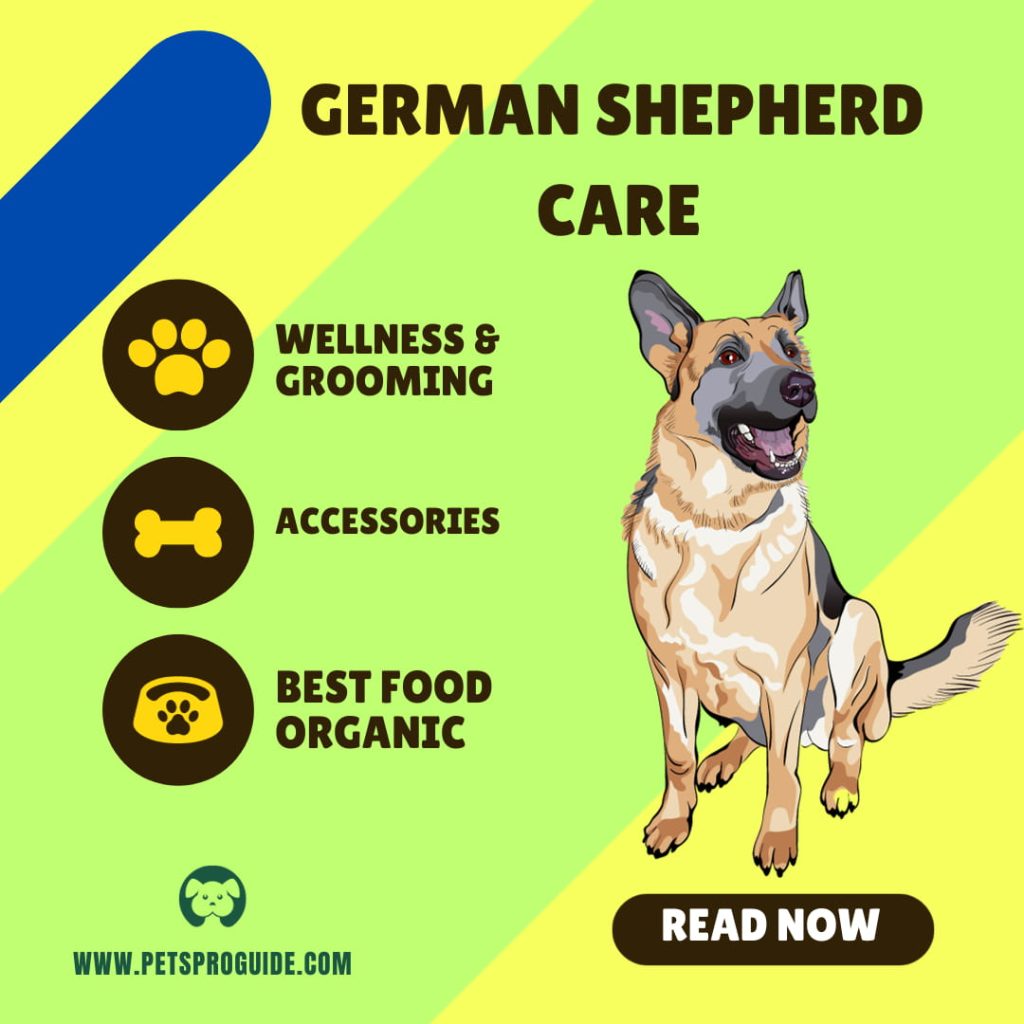
Common German Shepherd Breed Health Conditions
While German Shepherds are generally healthy dogs, they can be prone to certain health issues. Here are ten common health conditions that may affect German Shepherds:
- Hip Dysplasia
- Elbow Dysplasia
- Degenerative Myelopathy
- Exocrine Pancreatic Insufficiency (EPI)
- Bloat (Gastric Dilatation Volvulus)
- Allergies
- Panosteitis
- Hemophilia
- Cataracts
- Progressive Retinal Atrophy (PRA)
German Shepherd Care Pro Tips
Here are ten care tips to ensure your German Shepherd’s well-being and happiness:
- Regular veterinary check-ups
- Provide a balanced diet and monitor food intake
- Regular exercise and mental stimulation
- Socialization and training from an early age
- Safe and secure fencing for outdoor play
- Dental care and oral hygiene
- Weight management to avoid obesity-related issues
- Regular grooming to maintain a healthy coat
- Monitor joint health, especially in older dogs
- Provide plenty of love and attention, as German Shepherds thrive on companionship.

Is German Shepherd Good Family Dog?
Yes, German Shepherds can be excellent family dogs, especially when raised with children and other pets. Their loyal and protective nature makes them great guardians for families, but early socialization and training are crucial to ensure they are well-behaved and gentle around children.
What to know before you buy a German Shepherd?
Before bringing a German Shepherd into your home, consider these ten important points:
- Commitment to training and socialization.
- Time and energy for regular exercise and mental stimulation.
- Space and a secure backyard for play and exercise.
- Grooming requirements and shedding season management.
- Financial responsibility for veterinary care and quality dog food.
- Training to prevent jumping and leash pulling due to their size and strength.
- Potential health issues and regular vet check-ups.
- Understanding their protective instincts and how to manage them.
- The need for companionship and family interaction.
- A loving and understanding attitude towards their loyalty and devotion.
German Shepherd Breed Fun Facts
Here are ten fun and fascinating facts about German Shepherds:
- German Shepherds were first used as herding dogs for sheep, but their versatility quickly led them to become police and military dogs.
- Rin Tin Tin, a German Shepherd, became a famous Hollywood star in the 1920s.
- German Shepherds have a powerful bite force, making them excellent protection dogs.
- They are highly ranked in intelligence and problem-solving skills among dog breeds.
- German Shepherds can be trained to perform complex tasks such as search and rescue, detecting drugs, and guiding the visually impaired.
- The American Kennel Club (AKC) officially recognized German Shepherds as a breed in 1908.
- Their straight back and sloping hindquarters give them an iconic and distinctive appearance.
- German Shepherds have been used as therapy dogs to provide emotional support to those in need.
- They were initially known as “Alsatian Wolf Dogs” due to their wolf-like appearance and origin in the Alsace region.
- German Shepherds have played important roles in the police and military forces of many countries around the world.
FAQs
1. Q: Are German Shepherds good with children?
2. Q: Do German Shepherds shed a lot?
3. Q: Are German Shepherds easy to train?
4. Q: Do German Shepherds get along with other pets?
5. Q: How much exercise do German Shepherds need?
6. Q: Are German Shepherds good guard dogs?
7. Q: Are German Shepherds hypoallergenic?
8. Q: Do German Shepherds have health issues?
9. Q: Do German Shepherds need a lot of grooming?
10. Q: Are German Shepherds good family pets?
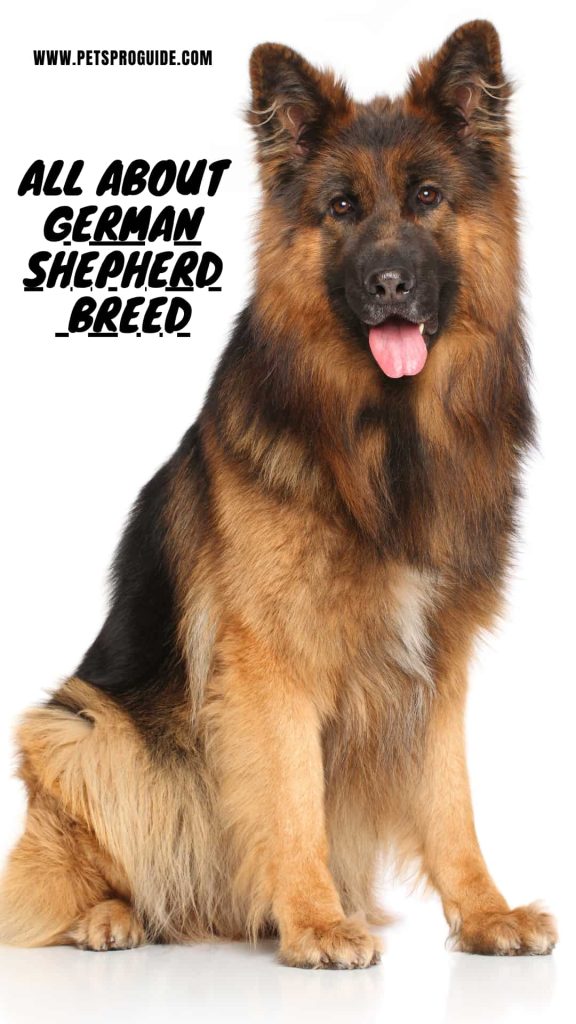
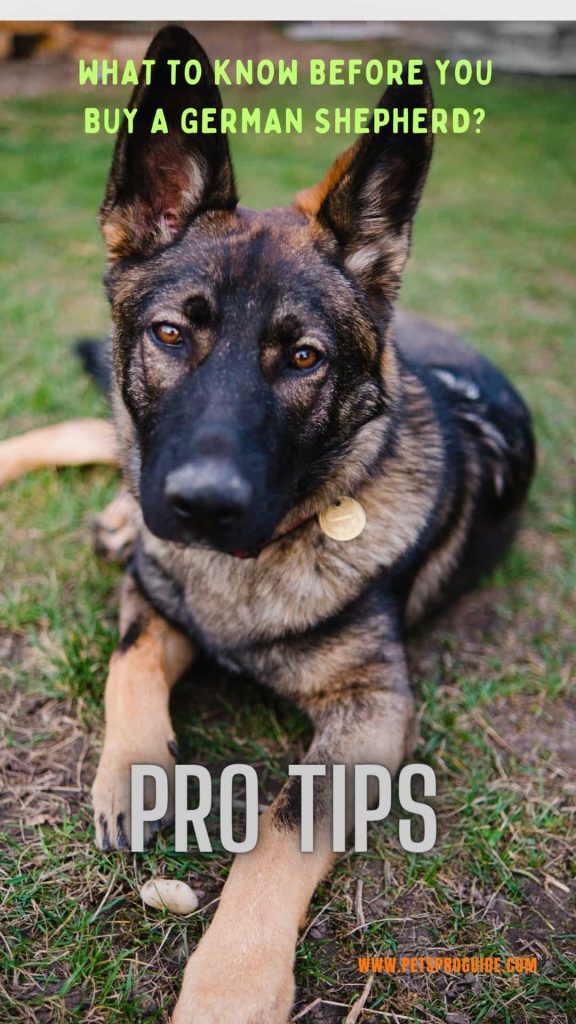
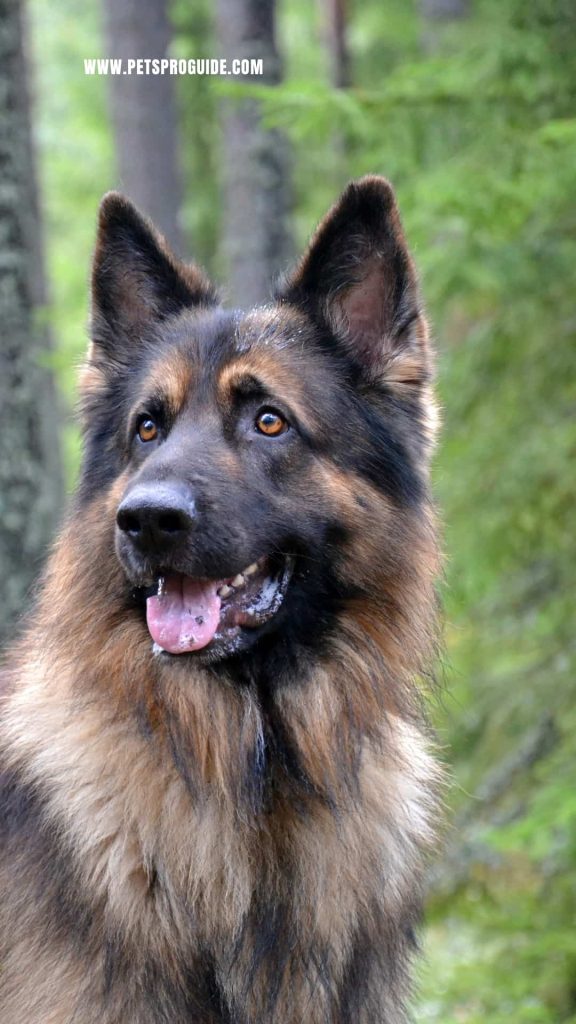
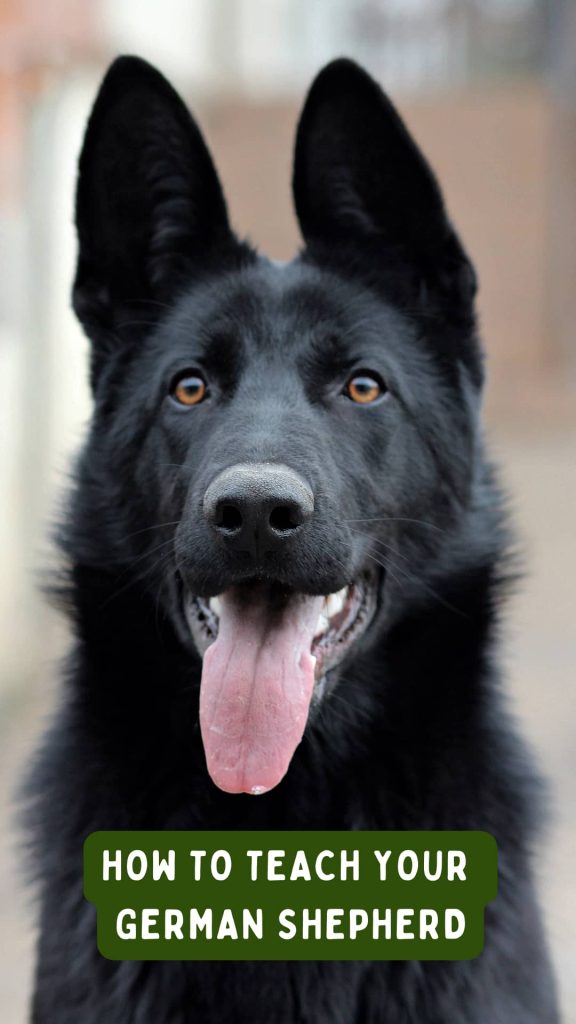
Conclusion
The German Shepherd is a remarkable and versatile breed that excels in various roles due to its intelligence, loyalty, and courage. Whether as a working dog or a beloved family companion, the German Shepherd’s exceptional qualities make it a top choice for many dog enthusiasts.
However, this breed requires commitment in terms of training, exercise, and grooming to ensure they thrive physically and mentally. If you’re ready for the responsibilities and rewards of having a German Shepherd, they can bring immense joy and love to your life.
If you really enjoyed the article “German Shepherd Breed Information and Pictures,” then I would be very grateful if you’d help it spread by emailing it to your friends or sharing it on Twitter, Instagram, or Facebook. Thank you!





